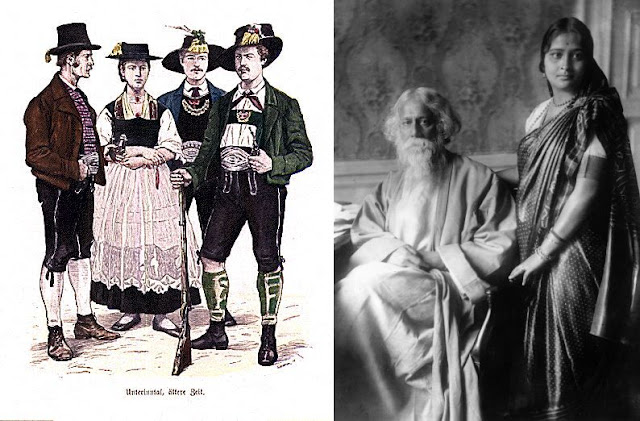“...I lent Kafka a German translation of the Indian religious text, the Bhagavad Gita.
Launched on Nov 29 2006, now 2,500+ posts...This bilingual blog - 'आन्याची फाटकी पासोडी' in Marathi- is largely a celebration of visual and/or comic ...तुकाराम: "ढेकणासी बाज गड,उतरचढ केवढी"...George Santayana: " Everything in nature is lyrical in its ideal essence, tragic in its fate, and comic in its existence"...William Hazlitt: "Pictures are scattered like stray gifts through the world; and while they remain, earth has yet a little gilding."
मेघदूत: "नीचैर्गच्छत्युपरि च दशा चक्रनेमिक्रमेण"
समर्थ शिष्या अक्का : "स्वामीच्या कृपाप्रसादे हे सर्व नश्वर आहे असे समजले. पण या नश्वरात तमाशा बहुत आहे."
G C Lichtenberg: “It is as if our languages were confounded: when we want a thought, they bring us a word; when we ask for a word, they give us a dash; and when we expect a dash, there comes a piece of bawdy.”
C. P. Cavafy: "I’d rather look at things than speak about them."
Martin Amis: “Gogol is funny, Tolstoy in his merciless clarity is funny, and Dostoyevsky, funnily enough, is very funny indeed; moreover, the final generation of Russian literature, before it was destroyed by Lenin and Stalin, remained emphatically comic — Bunin, Bely, Bulgakov, Zamyatin. The novel is comic because life is comic (until the inevitable tragedy of the fifth act);...”
सदानंद रेगे: "... पण तुकारामाची गाथा ज्या धुंदीनं आजपर्यंत वाचली जात होती ती धुंदी माझ्याकडे नाहीय. ती मला येऊच शकत नाही याचं कारण स्वभावतःच मी नास्तिक आहे."
".. त्यामुळं आपण त्या दारिद्र्याच्या अनुभवापलीकडे जाऊच शकत नाही. तुम्ही जर अलीकडची सगळी पुस्तके पाहिलीत...तर त्यांच्यामध्ये त्याच्याखेरीज दुसरं काही नाहीच आहे. म्हणजे माणसांच्या नात्यानात्यांतील जी सूक्ष्मता आहे ती क्वचित चितारलेली तुम्हाला दिसेल. कारण हा जो अनुभव आहे... आपले जे अनुभव आहेत ते ढोबळ प्रकारचे आहेत....."
Kenneth Goldsmith: "In 1969 the conceptual artist Douglas Huebler wrote, “The world is full of objects, more or less interesting; I do not wish to add any more.”1 I’ve come to embrace Huebler’s ideas, though it might be retooled as “The world is full of texts, more or less interesting; I do not wish to add any more.” It seems an appropriate response to a new condition in writing today: faced with an unprecedented amount of available text, the problem is not needing to write more of it; instead, we must learn to negotiate the vast quantity that exists. How I make my way through this thicket of information—how I manage it, how I parse it, how I organize and distribute it—is what distinguishes my writing from yours."
Tom Wolfe: "The first line of the doctors’ Hippocratic oath is ‘First, do no harm.’ And I think for the writers it would be: ‘First, entertain.’"
विलास सारंग: "… इ. स. 1000 नंतर ज्या प्रकारची संस्कृती रुढ झाली , त्यामध्ये साधारणत्व व विश्वात्मकता हे गुण प्राय: लुप्त झाले...आपली संस्कृती अकाली विश्वात्मक साधारणतेला मुकली आहे."
Sunday, June 25, 2017
टागोरांचा टीरोलियन ड्रेस घातलेला गूढवाद...Franz Kafka on Indian Religious Devotions and Rabindranath Tagore
“...I lent Kafka a German translation of the Indian religious text, the Bhagavad Gita.

4 comments:
Thanks Avadhoot.
Yes I was aware of the attacks on the credibility of the book. But I agree with Francine Prose:
"reading Janouch, I thought: If Kafka didn’t say all these things, he said some of them and should have said the rest. Perhaps he might have admired Janouch’s exploration of the line between appropriation, ventriloquism, and spirit possession: channeling, we might call it. I want to believe that Kafka said what Janouch wrote down, just as I want more than ever to pretend that I am walking in Janouch’s place, pestering Franz Kafka with sophomoric questions and thirstily imbibing the gnomic, goofy poetry of the master’s pontifications."
In fact I feel Kafka I quote is authentic because his criticism of Hinduism was NOT new.
Also तिरस्कार निराळा, आणि अंतहीन नैराश्य निराळं, असं वाटतं...I agree but I can see how the one can, at lease sometimes, lead to another.
I am surprised to find the word छाटी used in your post for Shawl worn by Tagore. It is wrong. छाटी had been used by monks. Tagore was never a monk.
Thanks Mr. Shaligram.
I have not used it. I have just quoted what used to be said in some quarters of Maharashtra.
It's entirely possible the usage of the word 'chhati' itself, instead of shawl, was for a purpose.
Post a Comment